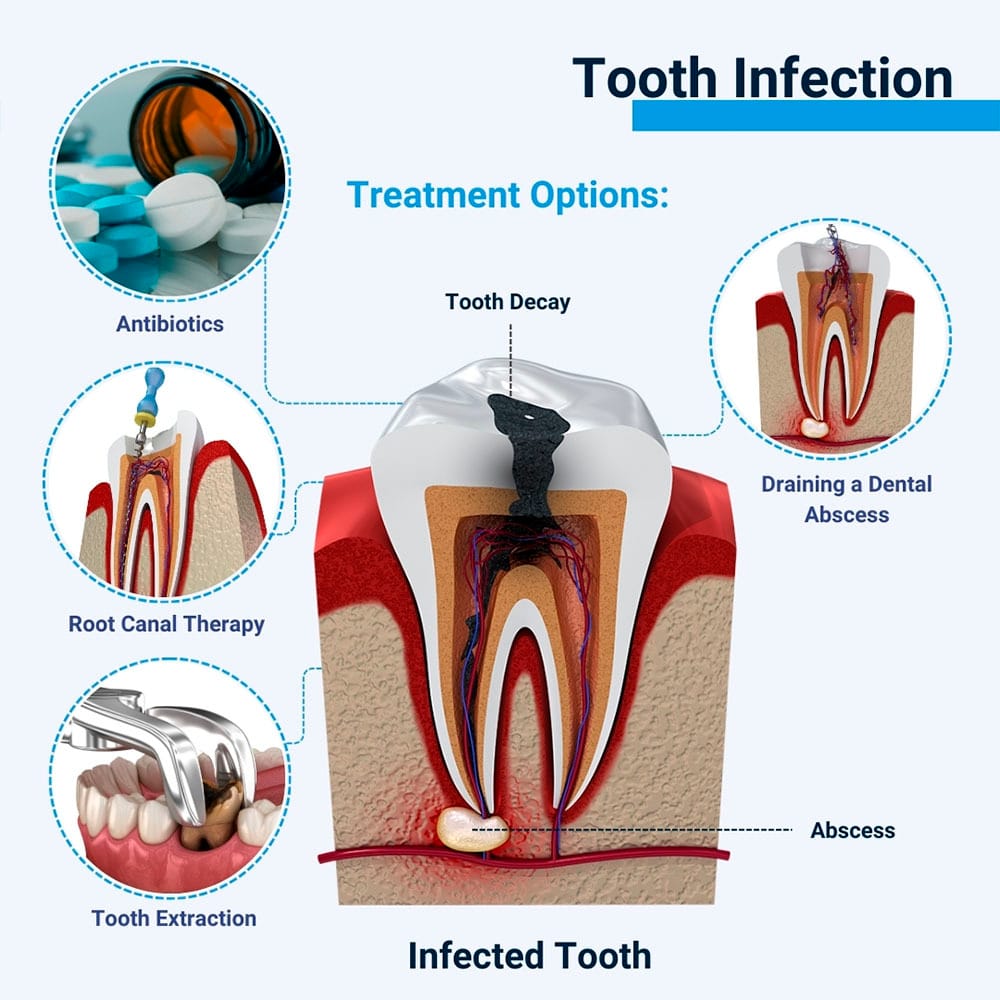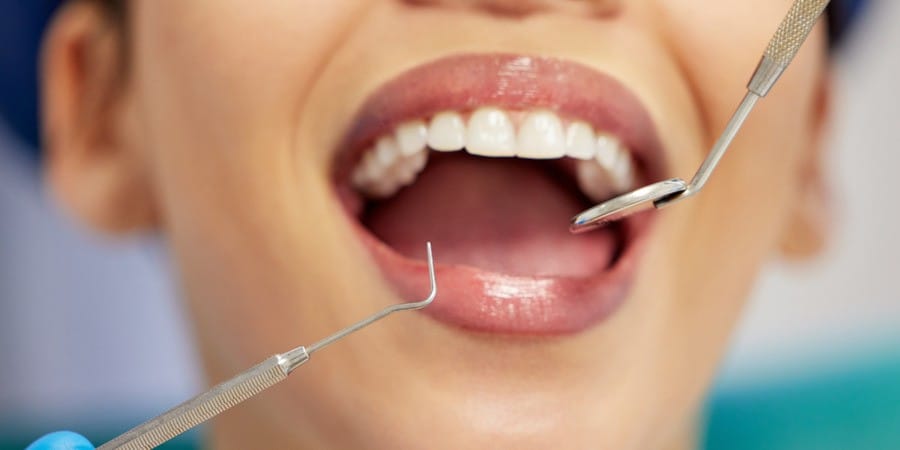How Can a Tooth Become Infected?
Your mouth is not a clean environment and contains many different strains of bacteria, some harmful and infectious. These bacteria are in plaque, a sticky biofilm that continually forms over your teeth.
When your teeth are healthy, these bacteria cannot penetrate the outer coating of tooth enamel. If a tooth is damaged, cracked, or decayed, these bacteria will enter the tooth, gradually eroding the dentin underneath and reaching the tooth pulp.
The tooth pulp is a collection of soft tissues that includes the tooth nerve. Any infection and inflammation can be very painful. Without treatment, there is a risk that the infection will spread to your jaw and nearby teeth. This type of infection is called a dental abscess.
A dental abscess can impact overall health. The infection can make you feel very unwell and cause facial swelling or a fever and swollen lymph glands. It is a condition that requires emergency dental care.
What Are the Signs of a Tooth Infection?
Signs that a tooth is infected can include:
- Tooth pain that may be continual, throbbing, or sharp, or only present when you eat.
- Pain that radiates out to your neck, jaw, or ear.
- Tooth sensitivity to temperature changes.
- Bad breath or a nasty taste.
- Swollen red gums around the affected tooth.
- A pimple or open sore on the side of the gum.
- The infected tooth could feel loose.
What Causes a Tooth Infection?
Any issue that allows bacteria to enter your tooth can cause an infection. The most common causes can include:
- Untreated cavities.
- Cracked, broken, or chipped teeth.
- Gum disease.
- Any injury to the tooth as this can damage the pulp.

Diagnosing a Tooth Infection
During your appointment, we can gently examine the tooth and test it to see if it is sensitive to pressure or temperature changes. Digital dental X-rays let us determine if any infection has spread and plan suitable treatment.
Treating a Tooth Infection
Your treatment will aim to eliminate the infection and try to save the tooth. Some of the treatments we may prescribe are outlined below.
Antibiotics
Antibiotics can help eliminate any bacteria remaining after your dental treatment. If we prescribe antibiotics, it’s important to complete the course.
Root Canal Therapy
This treatment helps get rid of infection from deep inside the tooth pulp. Topical antibiotics may be inserted into the tooth to destroy any remaining bacteria. Afterward, we can seal and restore the tooth with a dental crown.
Dental Abscess Drainage
It may be necessary to make a small incision into your gum to drain a dental abscess. The incision can be kept open by inserting a tiny drain made of rubber to get rid of all pus.
Tooth Extraction
When a dental abscess is severe, and the infection has spread, we may need to extract a tooth. This would be the last option.
Diagnosing and Treating Wisdom Tooth Infections
Wisdom teeth can also become infected and cause problems. These third molars at the back of your mouth don’t come through until the late teens or 20s. Modern jaws are often too small to accommodate wisdom teeth properly. As a result, these teeth can partially erupt and become infected or are impacted.
When wisdom tooth problems occur, the best solution is to remove these teeth before the infection can affect nearby teeth, gums, and jawbone.
How to Tell If You Have a Wisdom Tooth Infection
If you have regular dental exams, we will closely monitor the development of your wisdom teeth using digital dental X-rays.
However, if you haven’t seen a dentist regularly and think your wisdom teeth are infected, you may experience some of the following symptoms.
- Toothache.
- Halitosis or bad breath.
- An unpleasant taste.
- Jaw pain or facial swelling.
- Difficulty opening or closing your mouth without pain.
- Swollen lymph glands in your neck.
How to Reduce Your Risk of Tooth Pain
Many dental problems can be prevented with the right oral care. This includes a good oral hygiene routine at home and professional dental checkups and appointments.
This approach helps ensure harmful bacteria cannot build up to unmanageable numbers in your mouth, helping you maintain healthy teeth and gums.
If you damage a tooth, getting professional dental care is always important. Even a small chip or crack in a tooth can allow harmful bacteria to enter it and cause problems.
Do You Think You Have a Tooth Infection?
If you have noticed a tooth doesn’t feel right or is painful or that the gum around the tooth is swollen or developing a pimple, contact us to schedule your dental appointment.
The sooner we can treat a tooth infection, the greater the chance we can save it. Prompt treatment through our general dentistry services also helps prevent the infection from spreading beyond your tooth.

